#club100||Selling and Buying Rice Seeds Ready for Planting
Selling and Buying Rice Seeds Ready for Planting in Matang Ubi Village
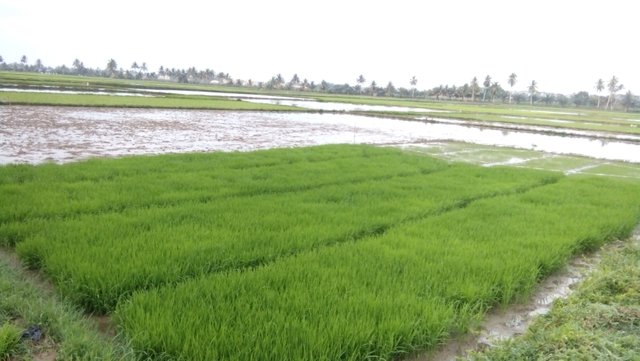
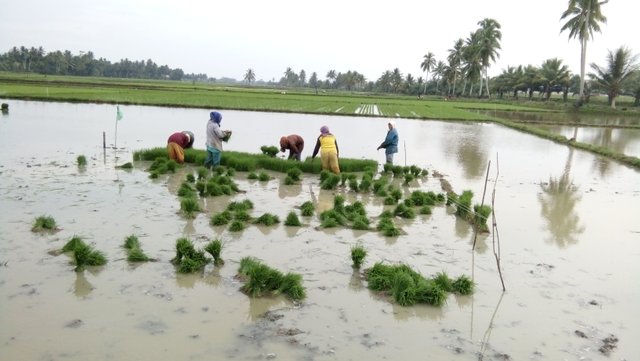
Based on the author's observations, the geographical condition of Trieng Matang Ubi Village, Lhoksukon District, which is located in the lowlands with a large rice field area with a total area of 33 hectares, makes most of the residents of Trieng Matang Ubi Village, Lhoksukon District, work as farmers. Usually, farmers in Trieng Matang Ubi Village go down to the fields twice a year, at the beginning of the year and in the middle of the year. The schedule for going down to the fields really depends on the availability of water sourced from step irrigation.
According to one farmer interviewed by the author, the need for rice seeds is absolute, it is even very risky for small farmers who sow seeds in not too many quantities during the rainy season or when there is a flood and the attack of gold snail pests which causes farmers to lack ready rice seeds. plant. This causes its own impact and difficulties, so that there is widespread buying and selling of ready-to-plant rice seeds.
The practice of buying and selling ready-to-plant rice seeds in Trieng Matang Ubi Village, Lhoksukon District, cannot be separated from several factors and conditions that are the reasons for this buying and selling practice. According to Mr. Amiruddin as Geuchik Gampong, most of the people of Trieng Matang Ubi Village are farmers by profession, so they depend on agricultural products for their livelihood to meet their daily needs.
The basic needs at the beginning of the rice planting period are healthy and quality rice seeds which are planted early in the field, but in reality the Trieng Matang Ubi Village and surrounding villages are located in lowlands and even many peatlands often flood, so for farmers who they don't sow a lot of seeds, they generally experience difficulties, namely not enough seeds that are ready to be planted, so they generally buy from farmers who have excess seeds.
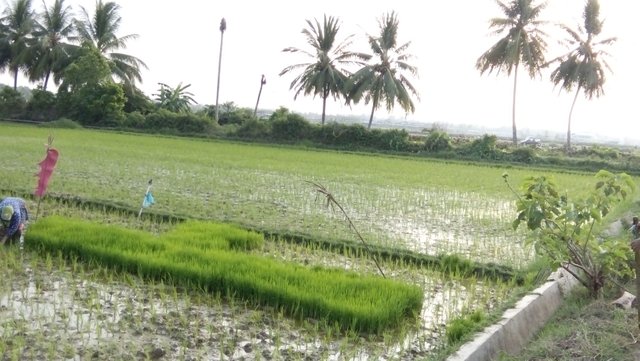
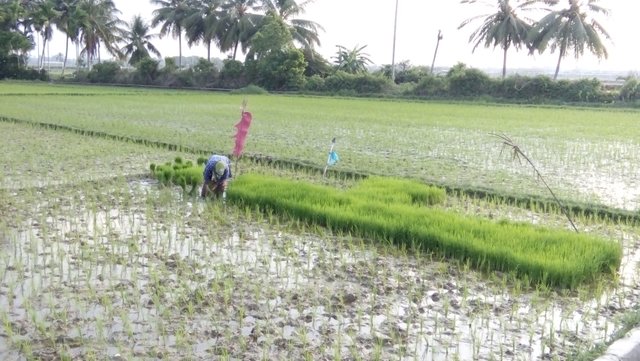
The advantage that farmers who own ready-to-plant seeds get by selling them with a grip system or often called one gasai is that all the seeds sell without being sorted by farmers who buy them for the quality of the seeds. This is as the results of the author's interview with Mrs. Bariah who owns approximately half a hectare of rice fields, in the last planting season she experienced an excess of ready-to-plant rice seeds aged 22 days in approximately three seuneulhong plots (nursery). By selling it he got some money and all the seeds were bought out, although some were of poor quality because the seeds were more than 20 days old.
While the practicality factor for seed owners is also one of the factors in the sale and purchase of ready-to-plant rice seeds in Trieng Matang Ubi Village, Lhoksukon District. As conveyed by Mr. Rusli to the author, for farmers who have excess ready-to-plant rice seeds, when they have finished planting their fields as a whole, the seeds must still be removed from the seedbed (seuneulhong) and the former seedbed (seuneulhong) must be planted like other fields.
By selling the ready-to-plant rice seeds, farmers who have excess seeds do not have to bother pulling the seeds out and replanting them in the former nursery (seuneulhong) because this will be done by the farmers who bought the rice seeds.
Meanwhile, for farmers who buy ready-to-plant rice seeds, the factor of urgent need is the main reason they buy ready-to-plant seeds. According to Ms. Rohani, farmers usually sow one box of 5 kg seed for each mah (1,600 M), but it often happens that not all the seeds sown can become ready-to-plant seeds due to the attack of gold snail pests or flooded due to high rainfall so for meet the needs of seeds at the time of planting, farmers who lack seeds will buy them from farmers who have excess rice seeds ready for planting.
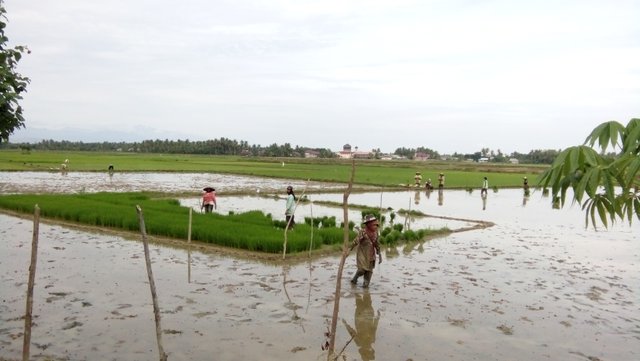
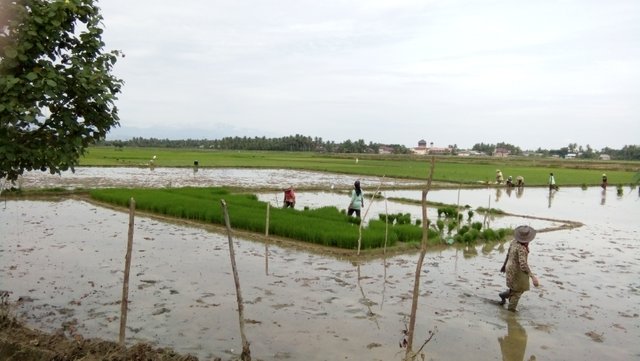
The same thing was conveyed by Mr. Ismail, a farmer in Trieng Matang Ubi Village. Usually to meet the need for rice seeds for his four plots of rice fields, at the beginning of each season he sows 5 (five) boxes of seeds, but in the last planting season his fields were submerged due to the low position of the fields so that the seedbed (seuneulhong) was also submerged which resulted in a lot of flooding. the seed sown dies. To meet the need for seeds at the time of planting, whose time was very short, he bought them from neighbors who had excess seeds because to sow other seeds to replace dead seeds was no longer possible in terms of time because the planting period had arrived, while waiting for new seeds to be sown required a minimum period of 16 (sixteen) days, it could even be more so that the alternative of buying ready-to-plant seeds is an option that must be taken.
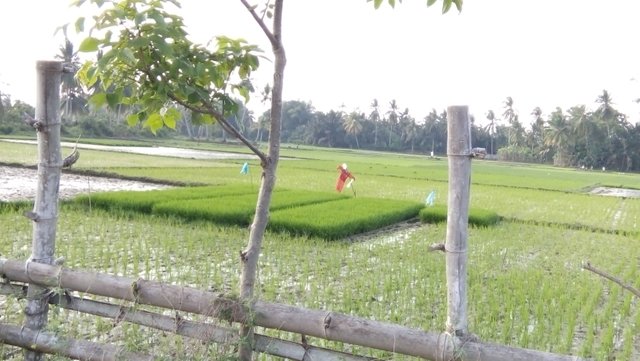
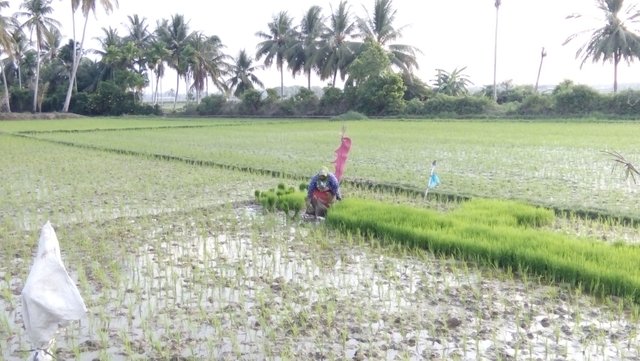
From the results of the author's interview in Trieng Matang Ubi Village, Lhoksukon District, both with farmers who buy and sell ready-to-plant rice seeds, it can be seen that the practice of buying and selling ready-to-plant rice seeds in Trieng Matang Ubi Village is caused by some farmers experiencing a shortage of ready-to-plant rice seeds due to pest attack or flooding while the planting season has arrived while on the other hand there are a few farmers who have excess rice seeds so that it will be more practical and economically profitable if they are sold.
From the results of the author's research by conducting direct observations and interviews with farmers both selling and buying ready-to-plant rice seeds in Trieng Matang Ubi Village, Lhoksukon District, North Aceh Regency, the author can describe the flow of buying and selling ready-to-plant rice seeds starting when farmers who shortage of seeds looking for ready-to-plant seeds to cover the shortage of seeds experienced.
Based on the author's interview with Mr. Amir, one of the farmers who buys ready-to-plant seeds in Trieng Matang Ubi Village, based on his experience last planting season, the search for ready-to-plant rice seeds has been carried out since he saw that the rice seeds he sowed were insufficient due to almost half of them being eaten by snails. mas while sowing other seeds will take longer and be troublesome, anticipating this he looks for fields with lots of rice seeds and most likely will have excess seeds then he goes to the owner of the seed to ask the owner's willingness to sell it to him when the time to pull the seeds comes.
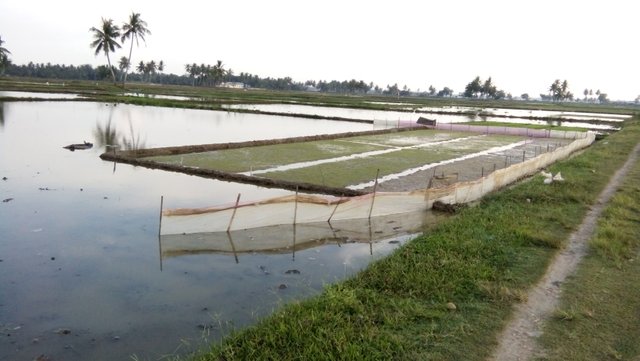
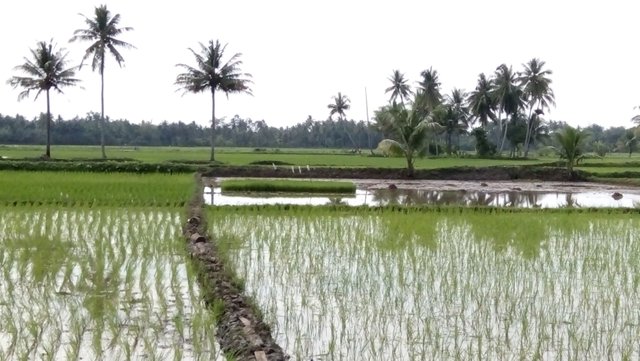
The same thing was conveyed by Mrs. Hafasah to the author, where at the time of planting she did not predict that there would be a shortage of seeds so she did not anticipate it from the start. On the day of planting, he and other women farmers planted two plots of rice fields, but there was a shortage of seeds to plant even though the numbers were relatively small. He immediately went to his neighbor who was close to his rice field and had excess seeds to buy ready-to-plant rice seeds of about 30 (thirty) handfuls (gasai) to cover the shortage of seeds so that they could be planted on the same day.
Based on the author's observations during the planting season in Trieng Matang Ubi Village, after farmers who lack ready-to-plant seeds look for farmers who have excess ready-to-plant seeds and find ready-to-plant rice seeds to buy, the next process is for these farmers to bargain or negotiate prices for ready-to-plant rice seeds. planting for each handful (gasai) and the number of ready-to-plant seeds to be purchased.
According to Mrs. Aisyah as a farmer who in the last planting season had to buy ready-to-plant rice seeds due to a shortage of seeds, the price for ready-to-plant rice seeds depends on the type of seed itself. In general, hybrid seeds will be more expensive than ordinary ready-to-plant rice seeds, but he himself does not like hybrid rice seeds because the maintenance is more expensive even though the yields are higher. For the price of ready-to-plant rice seeds in general in Trieng Matang Ubi Village and its surroundings, it ranges from Rp. 1,500 to Rp. 2,000 per one hand (gasai), the price provided that the buyer pulls out the ready-to-plant rice seeds himself at the seedbed (seneulhong) owned selling farmer. The number of seeds sold depends on a mutual agreement which is influenced by the size of the shortage of seeds that must be covered and the need for seeds that may still be needed by the selling farmer for himself.
Thank You Very Much for Visiting and Reading My Blog


SPECIAL THANKS TO:
@nane15
@japansteemit
@juichi
@tomoyan
@yasu
@zulhendra
@ponpase
@malihafarhan
@ecoshynthesizer
@dr-frankenstein
Best Regard
@abialfatih
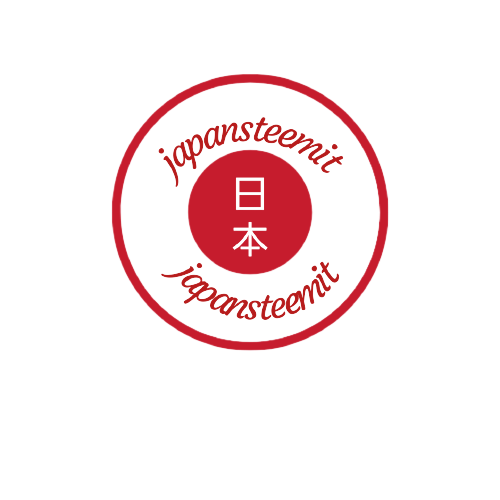
Note: You must enter the tag #fintech among the first 4 tags for your post to be reviewed.
Thanks for your attention and support
Thak you for sharing this with us. Keep steeming!